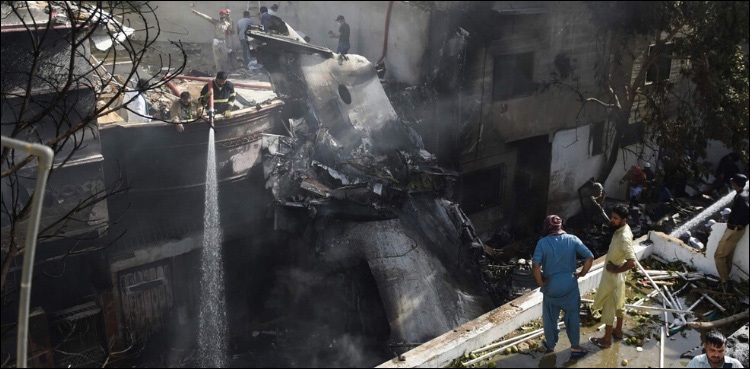The AAIB has issued the final report on the PIA Karachi plane crash, attributing the accident to human error. It highlighted communication issues between the pilots and air traffic controllers. The report also mentioned that the aircraft’s last four-minute data was not recorded due to engine failure. Responsibility was placed on PIA and the Pakistan Civil Aviation Authority.

ISLAMABAD: The Aircraft Accident Investigation Board (AAIB) has released the final investigation report of the Pakistan International Airlines (PIA) Airbus A320 flight four years after the incident, ARY News reported.
On May 22, 2020, a PIA Airbus A320 coming from Lahore crashed in Karachi. The catastrophic aviation disaster took the lives of 99 passengers including the crew and two people on the ground. Only two passengers survived the crash.
The final investigation report said that the accident was caused by human error. It added that the pilot had been warned four times by the air traffic controller before landing that the plane was at extraordinary altitude.
The findings said that there was a lack of communication and harmony between the two pilots of the aircraft and the air traffic controllers.
According to the report, the two pilots made the first landing attempt without opening the landing gears, during which its engines struck the runway and caught fire. The report added that the air traffic controller did not inform the pilots about the engine’s fire.
It added that the plane’s last four-minute data could not be recorded as engine failure cut the electricity supply.
The report put the administrative responsibility for the accident on the PIA and the Pakistan Civil Aviation Authority (CAA) as well.
The recent release of the final report by the Air Accidents Investigation Branch (AAIB) regarding the PIA Karachi plane crash has brought to light crucial findings and recommendations. The report delves into the various factors that contributed to the tragic incident, offering a comprehensive analysis of the circumstances leading up to the crash. It underscores the importance of thorough investigations and the implementation of safety measures to prevent such occurrences in the future.
According to the report, the investigation revealed critical shortcomings in the maintenance and operational aspects of the aircraft. Furthermore, the role of human error and regulatory oversight were identified as significant contributors to the tragic event. The findings serve as a sobering reminder of the complex and multi-faceted nature of aviation safety.
In response to the report, it is imperative for stakeholders within the aviation industry to heed the recommendations put forth by the AAIB. Enhanced training protocols, stringent regulatory protocols, and a renewed focus on maintenance and operational standards are paramount to averting similar tragedies. Furthermore, the proactive collaboration between regulatory bodies, airlines, and aviation professionals is essential in ensuring the continuous improvement of safety standards.
The release of the AAIB’s final report is a pivotal moment in the aftermath of the PIA Karachi plane crash. It not only provides crucial insights into the causative factors but also serves as a call to action for the aviation industry as a whole. By prioritizing the implementation of the report’s recommendations, the industry can move towards a future where safety is uncompromised and tragedies of this nature are minimized.
As we reflect on the sobering lessons learned from this tragic event, the importance of robust safety measures and a relentless commitment to improvement are more evident than ever. The release of the AAIB’s final report serves as a reminder that the pursuit of utmost safety in aviation is a collective responsibility that demands the unwavering dedication of all involved parties. Let us honor the memory of those affected by this tragedy by embracing the imperative for continuous improvement and vigilance in ensuring the safety of air travel.
Source: ARY NEWS
The AAIB released the final report of the PIA Airbus A320 crash, attributing the accident to human error. Lack of communication and harmony between the pilots and air traffic controllers was highlighted, alongside details of the first landing attempt and the subsequent engine fire. Administrative responsibility was placed on PIA and the Pakistan Civil Aviation Authority.
Disclaimer:
This content is AI-generated using IFTTT AI Content Creator. While we strive for accuracy, it’s a tool for rapid updates. We’re committed to filtering information, not reproducing or endorsing misinformation. – Khabristan.pk for more information visit privacy policy








Leave a Comment